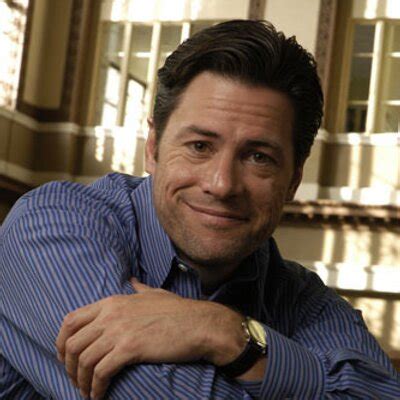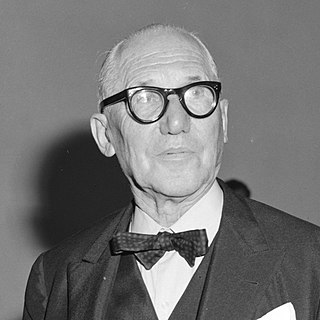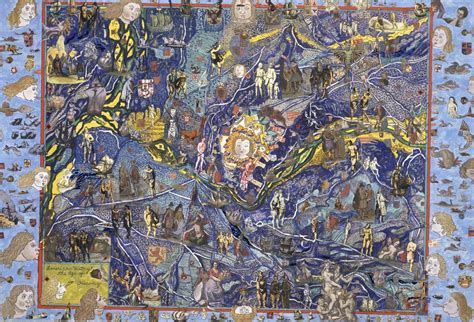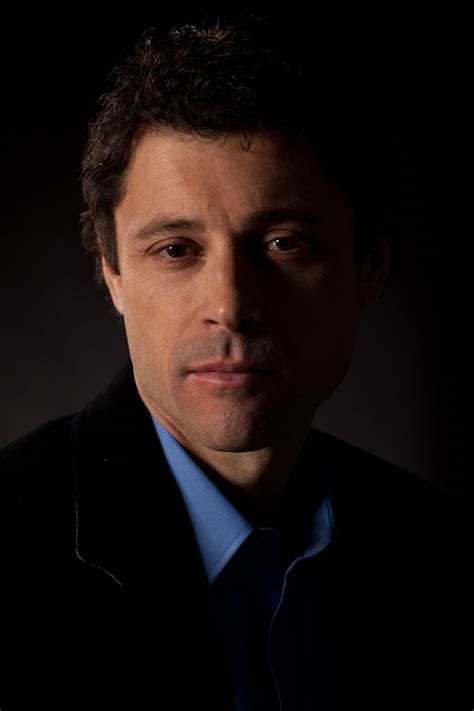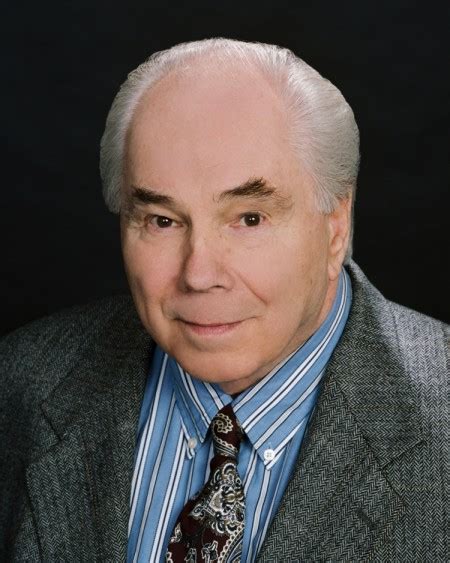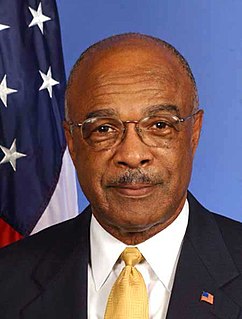Top 337 Ambiguity Quotes & Sayings - Page 6
Explore popular Ambiguity quotes.
Last updated on April 19, 2025.
Reality television paints a simple black-and-white world of good characters and bad characters; people we want to root for and people we want to see ruined. There is none of the gray ambiguity that colors real life. I no longer watch a lot of reality television, but sometimes I can't look away from 'Honey Boo Boo.' I just can't.
Different reactions while film test screening doesn't mean even the audience thinks ambiguity is a bad thing. But if you're asking them right away to start checking things off, they don't know what to do. I think at their best, it applies to when the audience knows what it is. Then, when they say, "Oh, well, I thought it was too boring in blah-blah-blah part," then you better pay attention to it. It's like going for the hamburger. Better be the good hamburger I went for.
The notion of ambiguity must not be confused with that of absurdity. To declare that existence is absurd is to deny that it can ever be given a meaning; to say that it is ambiguous is to assert that its meaning is never fixed, that it must be constantly won. Absurdity challenges every ethics; but also the finished rationalization of the real would leave no room for ethics; it is because man's condition is ambiguous that he seeks, through failure and outrageousness, to save his existence.
In overlooking, denying, evading this complexity--which is nothing more than the disquieting complexity of ourselves--we are diminished and we perish; only within this web of ambiguity, paradox, this hunger, danger, darkness, can we find at once ourselves and the power that will free us from ourselves. It is this power of revelation that is the business of the novelist, this journey toward a more vast reality which must take precedence over other claims.
I began dividing life in absolutes... Things and people were either perfectly bad, or perfectly good, and when life didn't obey this black-and-white rule, when things or people were complex or contradictory, I pretended otherwise. I turned every defeat into a disaster, every success into an epic triumph, and separated all people into heroes or villains. Unable to bear ambiguity, I built a barricade of delusions against it.
I am sorry to be so blunt, but I do not see much ambiguity here. [Barack] Obama was late to affirm the Egyptian revolution as a democratic movement, and even then he was eager to have installed those military leaders who were known for their practices of torture. And now he is quick to make allies with the Muslim Brotherhood for tactical reasons as well (though earlier that same administration stoked Islamophobic fear about that very political party).
Architecture is the masterly, correct and magnificent play of masses brought together in light. Our eyes are made to see forms in light; light and shade reveal these forms; cubes, cones, spheres, cylinders or pyramids are the great primary forms which light reveals to advantage; the image of these is distinct and tangible within us without ambiguity. It is for this reason that these are beautiful forms, the most beautiful forms. Everybody is agreed to that, the child, the savage and the metaphysician.
No matter how physically faint, a photograph involuntarily whisper of something exquisitely carnal. The weeks, the years, whatever stretches of time separating our present from the photographs retire into the transparence of the shot and seem erased by it. We almost have to shake ourselves to overcome the feeling that we peer out at the other place, in that different age. Yet we are always aware of this illusory dislocation, for such is the ambiguity, in principle, that seduces us over and over again in the photographic experience.
The most obvious and yet the oldest and most stubborn error on which the appeal of inflation rests is that of confusing ‘money’ with ‘wealth’…Real wealth, of course, consists in what is produced and consumed: the food we eat, the clothes we wear, the houses we live in. It is railways and roads and motor cars; ships and planes and factories; schools and churches and theaters; pianos, paintings and books. Yet so powerful is the verbal ambiguity that confuses money with wealth, that even those who at times recognize the confusion will slide back into it in the course of their reasoning.
The acceptance of ambiguity implies more than the commonplace understanding that some good things and some bad things happen to us. It means that we know that good and evil are inextricably intermixed in human affairs; that they contain, and sometimes embrace, their opposites; that success may involve failure of a different kind, and failure may be a kind of triumph.
Read Mann's notes, which contain precise accounts of cholera and its symptoms, and observe how careful he is throughout his fiction in getting medical details straight - then you might begin to wonder whether cholera is the only candidate for the cause of Aschenbach's death. What results from this, I think, is a deeper appreciation of Mann's brilliance in keeping so many possibilities in play. The ambiguity is even more artful than people have realized.
I love doing movies, but right now, television is the way Hollywood was in the late '60s and early '70s. The dream era I would have loved to have been part of in Hollywood then is happening right now, but it's happening on television, with these big complicated story arcs and real character-driven shows and sheer ambiguity left and right.
And I vaguely remember her smiling at me from the door way the glittering ambiguity of a girls smile, which seems to promise an answer to the question, but never gives it. The question, the one we’ve all been asking since girls stopped being gross, the question that is to simple to be uncomplicated: Does she like me or does she LIKE me?
Most people like to believe something is or is not true. Great scientists tolerate ambiguity very well. They believe the theory enough to go ahead; they doubt it enough to notice the errors and faults so they can step forward and create the new replacement theory. If you believe too much you'll never notice the flaws; if you doubt too much you won't get started. It requires a lovely balance.
In this world that God (or Mother Nature) created, it is always hazard and novelty-hazard and novelty-which assert themselves, thereby rendering notions of fixity absurd. Incongruously enough, however, when we allow ourselves to fully accept uncertainty, to embrace and cultivate it even, then we actually can begin to feel within ourselves the presence of an Absolute. The person who cannot welcome ambiguity cannot welcome God.
The blues is an art of ambiguity, an assertion of the irrepressibly human over all circumstance whether created by others or by one's own human failings. They are the only consistent art in the United States which constantly remind us of our limitations while encouraging us to see how far we can actually go. When understood in their more profound implication, they are a corrective, an attempt to draw a line upon man's own limitless assertion.
I try to write about complex issues--young people in an adult world-- full of irony and contradiction in a narrative style that relies heavily on suspense with a texture rich in emotion and imagery. I take a great deal of satisfaction in using popular forms-- the adventure, the mystery, the thriller-- so as to hold my reader with the sheer pleasure of a good story. At the same time I try to resolve my books with an ambiguity that compels engagement. In short, I want my readers to feel, to think, sometimes to laugh. But most of all I want them to enjoy a good read.
The way of trust is a movement into obscurity, into the undefined, into ambiguity, not into some predetermined, clearly delineated plan for the future. The next step discloses itself only out of a discernment of God acting in the desert of the present moment. The reality of naked trust is the life of the pilgrim who leaves what is nailed down, obvious, and secure, and walks into the unknown without any rational explanation to justify the decision or guarantee the future. Why? Because God has signaled the movement and offered it his presence and his promise.
Among all the complaints you hear these days about the crimes of the media, it seems to me the critics miss the big one. It is that especially TV, but also we of the print press, tend to reduce mess and complexity and ambiguity to a simple story line that doesn't reflect reality so much as it distorts it. ... What bothers me about the journalistic tendency to reduce unmanageable reality to self-contained, movielike little dramas is not just that we falsify when we do this. It is also that we really miss the good story.
There are some audiences who are uncomfortable with the ambiguity, though. They want a film to chew their food for them, they want Hollywood endings that tie everything together in the end and answer all of the questions. They are usually people on one extreme of the political spectrum or other and they haven't been happy because the film is not polemical enough on their side. They aren't usually people who aren't interested in understanding points of view that they disagree with - they just want to attack their opponents - and I'm ok with them not liking the film.
Mitchell Sanders was right. For the common soldier, at least, war has the feel-the spiritual texture-of a great ghostly fog, thick and permanent. There is no clarity. Everything swirls. The old rules are no longer binding, the old truths no longer true. Right spills over into wrong. Order blends into chaos, love into hate, ugliness into beauty, law into anarchy, civility into savagery. The vapors suck you in. You can't tell where you are, or why you're there, and the only certainty is overwhelming ambiguity.
American movie audiences now just don’t seem to be very interested in any kind of ambiguity or any kind of real complexity of character or narrative - I’m talking in large numbers, there are always some, but enough to make hits out of movies that have those qualities. I think those qualities are now being seen on television and that people who want to see stories that have those kinds of qualities are watching television.
There's the ambiguity of human relationships, for instance. A relationship between two people, just like a sequence of words, is ambiguous if it is open to different interpretations. And if two people do have differing views about their relationship - I don't just mean about its state, I mean about its very nature - then that difference can affect the entire course of their lives.
Yet again, an ancient answer echoes across the centuries: Listen! Listen to stories! For what stories do, above all else, is hold up a mirror so that we can see ourselves. Stories are mirrors of human be-ing, reflecting back our very essence. In a story, we come to know precisely the both/and, mixed-upped-ness of our very being. In the mirror of another's story, we can discover our tragedy and our comedy-and therefore our very human-ness, the ambiguity and incongruity, that lie at the core of the human condition.
It wasn't the intention to do something important, or to even relate about social issues. The ground is so fertile in the justice world, dealing with the death penalty and the Innocence Project, for characters that have a moral ambiguity, which we were both attracted to. It's the idea that everybody has their reasons. Whatever their actions are, whether you agree with them or not, you can understand why they're feeling that way, in terms of racism or even the death penalty.
A painting is an object which has an emphatic frontal surface. On such a surface, I paint a black band which does not recede, a color band which does not obtrude, a white square or rectangle which does not move back or forth, to or fro, or up or down; there is also a painted white exterior frame band which is edged round the edge to the black. Every part is painted and contiguous to its neighbor; no part is above or below any other part. There is no hierarchy. There is no ambiguity. There is no illusion. There is no space or interval (time).
I think the Bhagavad Gita is about both the forces of light and the forces of darkness that exist within our own self, within our own soul; that our deepest nature is one of ambiguity. We have evolutionary forces there - forces of creativity, and love, and compassion, and understanding. But we also have darkness inside us - the diabolical forces of separation, fear and delusion. And in most of our lives, there is a battle going on within ourselves.
I believe that we can still have a genre of scientific books suitable for and accessible alike to professionals and interested laypeople. The concepts of science, in all their richness and ambiguity, can be presented without any compromise, without any simplification counting as distortion, in language accessible to all intelligent people. I hope that this book can be read with profit both in seminars for graduate students and if the movie stinks and you forgot your sleeping pills on the businessman's special to Tokyo.
You will find ambiguity a great ally on your road to power. Give a sign of Slytherin on one day, and contradict it with a sign of Gryffindor the next; and the Slytherins will be enabled to believe what they wish, while the Gryffindors argue themselves into supporting you as well. So long as there is uncertainty, people can believe whatever seems to be to their own advantage. And so long as you appear strong, so long as you appear to be winning, their instincts will tell them that their advantage lies with you. Walk always in the shadow, and light and darkness both will follow.
The denial of "self" challenges only the notion of a static self independent of body and mind-not the ordinary sense of ourself as a person distinct from everyone else. The notion of a static self is the primary obstruction to the realization of our unique potential as an individual being. By dissolving this fiction through a centered vision of the transiency, ambiguity, and contingency of experience, we are freed to create ourself anew.
Myths, whether in written or visual form, serve a vital role of asking unanswerable questions and providing unquestionable answers. Most of us, most of the time, have a low tolerance for ambiguity and uncertainty. We want to reduce the cognitive dissonance of not knowing by filling the gaps with answers. Traditionally, religious myths have served that role, but today — the age of science — science fiction is our mythology.
Perhaps the safest thing to do at the outset, if technology permits, is to send music. This language may be the best we have for explaining what we are like to others in space, with least ambiguity. I would vote for Bach, all of Bach, streamed out into space, over and over again. We would be bragging of course, but it is surely excusable to put the best possible face on at the beginning of such an acquaintance. We can tell the harder truths later.
Isn't it grand, isn't it good, that language has only one word for everything we associate with love - from utter sanctity to the most fleshly lust? The result is perfect clarity in ambiguity, for love cannot be disembodied even in its most sanctified forms, nor is it without sanctity even at its most fleshly. Love is always simply itself, both as a subtle affirmation of life and as the highest passion; love is our sympathy with organic life.
To put it simply, we need to keep the arts in education because they instill in students the habits of mind that last a lifetime: critical analysis skills, the ability to deal with ambiguity and to solve problems, perseverance and a drive for excellence. Moreover, the creative skills children develop through the arts carry them toward new ideas, new experiences, and new challenges, not to mention personal satisfaction. This is the intrinsic value of the arts, and it cannot be overestimated.
...one of hallmarks of a creative person is the ability to tolerate ambiguity, dissonance, inconsistency, things out of place. But one of the rules of a well-run corporation is that surprise is to be minimized. Yet if this rule were applied to the creative process, nothing worth reading would get written, nothing worth seeing would get painted, nothing worth living with and using would ever get designed.
Just as God's love entered the world, thereby submitting to the misunderstanding and ambiguity that characterize everything worldly, so also Christian love does not exist anywhere but in the worldly, in an infinite variety of concrete worldly action, and subject to misunderstanding and condemnation. Every attempt to portray a Christianity of 'pure' love purged of worldly 'impurities' is a false purism and perfectionism that scorns God's becoming human and falls prey to the fate of all ideologies. God was not too pure to enter the world.
In the face of ambiguity, uncertainty, and conflicting demands, often under great time pressure, leaders must make decisions and take effective actions to assure the survival and success of their organizations. This is how leaders add value to their organizations. They lead them to success by exercising good judgment, by making smart calls when especially difficult and complicated decisions simply must be made, and then ensuring that they are well executed.




